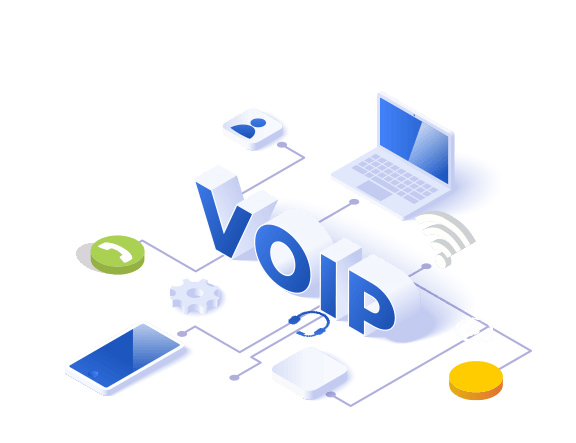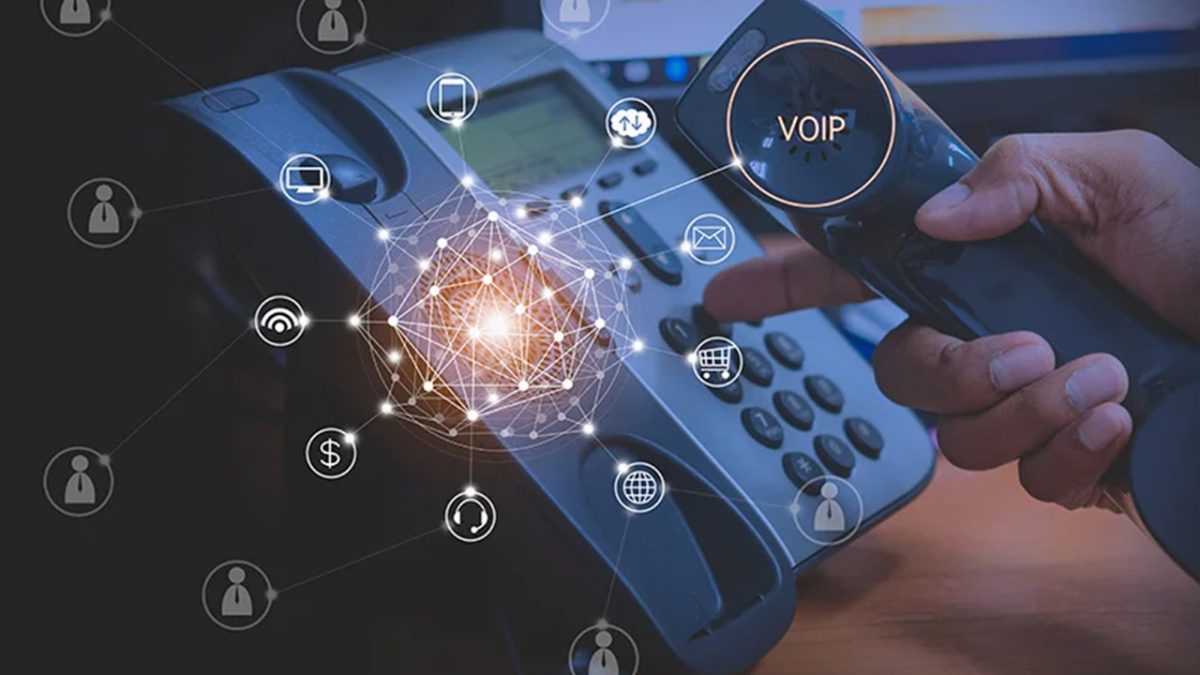People who are 30 years old or older may remember the initial advertisements for MagicJack, which pledged to eradicate telephone bills with a small gadget that can be inserted into a USB port on a computer that has an internet connection.
This gadget allowed users to place phone calls to any place in the world for a fee of just $19.95 per month. The technology that powered this device was a VoIP (Voice over Internet Protocol) service, which is now prevalent in today's world. Making VoIP calls is not complicated, and we can provide guidance on how to do so.
With that in mind, in this article, we will cover what VoIP is, how it operates, and how it compares to conventional phone networks.
What is VoIP?
Voice over Internet Protocol (VoIP) is a software technology that enables users to make phone calls over the internet. Many individuals are already familiar with this technology as it is utilized in various popular applications such as Discord, Facebook Messenger, and WhatsApp, among others. VoIP allows users to make calls through an internet connection instead of a phone line. Most apps that offer this functionality use VoIP technology.
What is not commonly known is that VoIP can also be utilized to call physical phone numbers. The technology has the capacity to convert a digital voice signal into a telephone signal, making it compatible with traditional phone networks. Examples of this in action include Skype, Google Voice, and other comparable services. As previously mentioned, the MagicJack device is another excellent illustration of this technology.
The challenge in explaining VoIP lies in the fact that it is a broad term that encompasses various scenarios of utilizing the internet to place a voice call. Although there are many other terms used to describe making calls over the internet, VoIP is the overarching term that encompasses them all. Essentially, if you are using an internet connection to make a voice call to another person, you are utilizing VoIP technology.
Before we proceed, there is one last topic that we need to address, which is video communication. While it is commonly acknowledged that VoIP technology can be used for both audio and video communication, in practice, when people refer to VoIP, they are typically referring to voice calls.

How VoIP works
VoIP technology is a process that involves various steps that work together to transmit voice or video calls over the internet. To initiate a call, you speak into a microphone, and your digital device captures your voice. The device then encodes your voice into a codec, which is a digital format that can be transmitted over the internet.
The encoded signal is then transmitted over the internet to the other person's device. The other device then decodes the signal and plays your voice or video for the other person. If either party is using a regular telephone or cellular line, an extra step is needed to convert the telephone signal into a digital signal, or vice versa.
All of these steps occur quickly enough that they essentially work in real-time. However, there may be a slight delay, which can be noticed during a test call with someone in the same room. This delay occurs due to the time needed for all the steps above to happen before the voice or video plays on the other person's device. In the case of video, the same process occurs, but video cannot be converted into a telephone signal.
VoIP compared to cellular and landline networks
There are several advantages to utilizing VoIP technology:
- Versatility: VoIP can be used on any device that has an internet connection, including smartphones, tablets, laptops, and personal computers. Since Wi-Fi is widespread, VoIP is accessible nearly everywhere, making it a convenient option.
- Cost-effective: VoIP is often free for data-to-data calls between individuals, making it a cost-effective option for both personal and business use. In business settings, it is often more cost-effective than traditional phone lines or cell phones. Additionally, many apps that offer free phone calls use VoIP technology.
- Multiple Numbers: VoIP services make it easy to obtain multiple phone numbers, allowing users to keep their personal and work lives separate. It is often the first choice for burner phone numbers.
- Stability and Quality: As long as the internet connection is stable, VoIP calls are usually reliable with high-quality audio and video. The transition from a data signal to a phone signal is typically seamless.
While VoIP technology offers several benefits, there are some limitations to keep in mind:
- Emergency Services: VoIP calls to emergency services can be problematic as the phone service may not be able to determine the caller's location accurately. This can delay emergency response times and potentially be life-threatening.
- Internet Connection: VoIP relies on a stable internet connection for quality calls. Issues like jitter, interference, and latency can cause unstable calls, which can be caused by various factors.
- Power Outages: VoIP requires a power source, which means it will not work during power outages unless there is a backup power supply.
- Multiple Apps: VoIP calls are usually made through specific apps that are not compatible with one another. Therefore, you may need to install multiple apps if you want to communicate with people who are using different apps. For example, Skype users can only call other Skype users or pay to call a phone number, but they cannot call people on other platforms like Discord or WhatsApp.
Cellular technology also offers several advantages:
- Convenience: Cellular technology is extremely convenient as it works nearly everywhere, as long as there is a phone tower in the vicinity. This makes it a reliable option for staying connected while on the go, and it is particularly useful in emergency situations where a landline may not be available.
- No Long-Distance Charges: With cellular technology, there are no long-distance charges. You can make calls to almost anyone regardless of their location without incurring any additional charges.
- Data Connection: Modern cell phones, especially smartphones, come with a data connection, which allows users to access VoIP services alongside cellular calls.
- Society Built around Cell Phones: The modern world is built around using cell phones. Modern vehicles have built-in wired or wireless phone charging, and hands-free phone calls can be made while driving. Many businesses offer charging stations and local Wi-Fi networks, making it easy for people to stay connected while on the go. We live in a society where cell phones are ubiquitous and widely accepted.
While cellular technology has many benefits, there are also several drawbacks:
- Susceptible to Power Outages: Cell towers require power to operate, and massive power outages can render cell phones useless.
- Distractions While Driving: Cell phones are a significant source of distraction while driving, which can be dangerous and pose a safety hazard.
- Expensive Monthly Plans: Cellular plans are often more expensive than landlines or VoIP services, which can be a financial burden for some users.
- Degrading Signal Quality: The voice and call quality of cellular technology degrade as signal strength weakens. This can result in poor call quality or dropped calls, particularly in areas with weak or inconsistent signal strength.
Landlines offer several benefits:
- Power Outage Resilience: Corded landlines are generally immune to power outages and natural disasters, making them a reliable form of communication during emergencies.
- Stability: Corded landlines are considered to be the most stable form of communication due to the infrastructure in place. The lines are typically buried underground and use a different system than cellular or VoIP services. This makes them less susceptible to interference or disruptions.
- Clear Voice Quality: The stable infrastructure of landlines results in clearer voice quality, making conversations easier to understand and less prone to distortion.
Despite their benefits, landlines also have some limitations:
- Lack of Convenience: Landlines are not as convenient as other forms of communication, as they are typically limited to use in one location. Additionally, if you use a corded phone, you must stay near the phone while on the call.
- Long-Distance Charges: Many landline providers still charge extra for long-distance phone calls, which is not the case for VoIP or cellular plans.
- Additional Fees for Features: Some landline providers charge extra fees for features like caller ID, or require additional equipment to use them, which can increase the overall cost of the service.
Conclusion
There are various communication technologies available today, including VoIP, cellular, and landlines. Each of these technologies has its own set of advantages and limitations. VoIP is versatile, cost-effective, and accessible from any device with an internet connection, but requires a stable internet connection to work well. Cellular technology is convenient and widely accepted, but can be costly and may experience signal quality issues. Landlines offer a stable and reliable form of communication, but lack convenience and may incur additional charges for features.
When selecting a communication technology, it's important to consider your specific needs, such as convenience, reliability, and cost-effectiveness. Ultimately, the best choice depends on individual circumstances and priorities.
VoIP vs. Cellular vs. Landlines: Pros and Cons and How VoIP Works



3175x175(CURRENT).thumb.jpg.b05acc060982b36f5891ba728e6d953c.jpg)
Recommended Comments
There are no comments to display.
Join the conversation
You can post now and register later. If you have an account, sign in now to post with your account.
Note: Your post will require moderator approval before it will be visible.